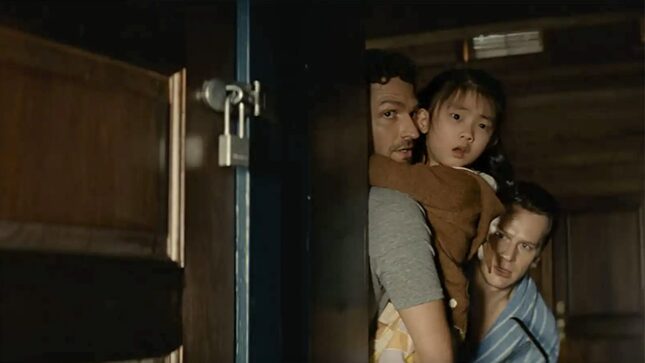‘Knock at the Cabin’ Puts Gay Dads Through Hell at the End of the World
M. Night Shyamalan’s new movie rather openly wonders if the destruction of the gay family could save humanity.
EntertainmentMovies

Warning: Spoilers below
It’s rare to leave a contemporary film wishing it had been more didactic, but such was my experience with M. Night Shyamalan’s Knock at the Cabin, a movie that flings a bunch of loaded suggestions at us and coyly invites us to quilt them into our own moral fabrics. This not a subtle movie—it’s 100 minutes of prolonged apocalyptic misery that hits us over the head in a final-act explication of exactly what’s happening—but it is vague in its implications. I left feeling less like my intelligence was being respected and more like my point of view had been gestured at, alongside a host of others on the political spectrum of the United States. This Cabin leaves its doors open, and it seems reasonable to assume that what’s guiding it is not benevolence or optimism for unity in our divided times, but a kind of both-sides-ism that can make an inherently political movie palatable enough to a mass audience.
Based on Paul Tremblay’s 2018 novel The Cabin at the End of the World, Knock at the Cabin concerns the country-home invasion of gay couple Andrew (Ben Aldridge) and Eric (Jonathan Groff). When a bespectacled Leonard (Dave Bautista) trots up to their adopted daughter Wen (Kristen Cui), she doesn’t say, “Oh, you must be my daddies’ good friend, what with your big muscles, shaved head, deep voice, and general vibe of cartoonish butchness.” She asks why he’s there, and he tells her that he’s there to be her friend. It’s a legitimately creepy scene, this encounter between oversharing child and soft-spoken, over-friendly adult. Then, Leonard and his pack of three other somber but determined compatriots invade the house and tie up Wen’s dads. Though the invasion is jarringly violent, this 30-minute section of the movie is likely to feel like treading water to anyone who has seen the trailer, as Leonard doesn’t get around to explaining what’s going on until about a half hour in: The apocalypse is upon them and the survival of the human race depends on the sacrifice of one member of this family. Leonard reveals that he and the other three—Sabrina (Nikki Amuka-Bird), Adriane (Abby Quinn), and Redmond (Rupert Grint)—all experienced visions that make them certain of the impending doom and the interfamily murder that must occur to stave it off.
-

-

-

-

-

-

-

-

-

-

-

-

-

-

-

-

-

-

-

-

-

-

-

-

-

-

-

-

-

-

-

-

-

-

-

-

-

-

-

-








































